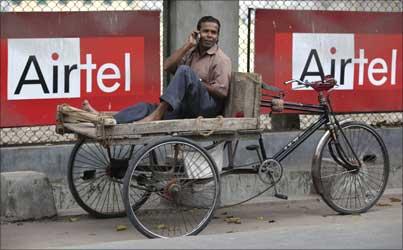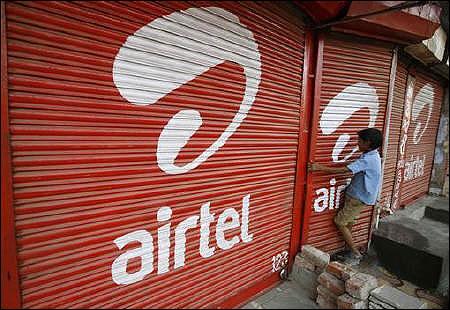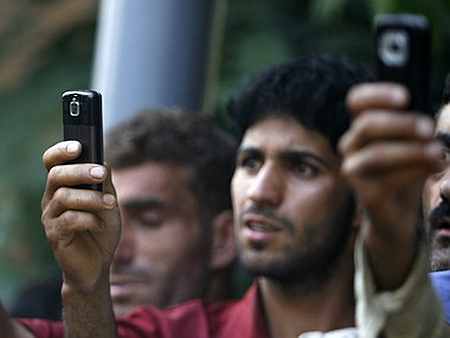
It's 9 am on a Saturday. You are fast asleep after a hectic day in office the previous day with marathon meetings stretching up to the wee hours. Your mobile rings. Sleep disrupted, you pick up the mobile with eyes half shut.
"Good morning, sir. Are you looking for a personal loan?" You murmur something to the effect "No, thanks" and try to catch the lost sleep. After 10 minutes, your phone rings again...
Obviously, you have not provided your mobile number, name or e-mail address to the callers. So how come they got to know your name and mobile number? In all probability, you haven't registered your number in the Do Not Call (DNC) or Do Not Disturb (DND) registry.
That's why you had to begin your day with a telemarketing executives calling to sell a loan product, insurance policy or a credit card. And it does not stop at calls. Even e-mailers are sent pitching products.
There is a huge, unorganised database market out there, where companies collect details of individuals through a variety of means and sell them to those interested - for a price.
...

There are multiple sources for procuring data. The simpler ones first. "We share clients' data with friends in other financial institutions," concedes a senior executive working for an international credit card company.
He recalls having received high net worth individuals' (HNIs) database from a former colleague in a foreign bank where he worked two years back. "The other source to get individuals' data are credit information bureaus. Of course, it is easier to get data from credit information bureaus if you are a banker. But you need the right contacts as data is not officially given out," he says.
Some data collectors research on the internet for contact details of individuals. Some manage to get the data from banks.
A Mumbai-based database vendor explains, "It is easy to get details if you have the 'right contact' in banks. Otherwise, you need to go to market-research companies, which provide data openly." However, the problem with such data is that is that it is often incomplete. "You will either get the mobile number, e-mail or the name." Getting the mobile number is the toughest part as despite the name, you need to search across telecom service providers. That's why we prefer getting mobile numbers as most of our clients want numbers with or without names." Event managers and seminar organisers also help, at a price.
The database vendors can be full-fledged companies or individuals running the show single-handedly. Some companies tie up with more than one vendor or list owner for data. Such firms are called database management/list management companies. Some firms also suggest which kind of data will be useful to you. At present, the size of the market is hard to fathom, but the demand is huge.
...

Business Standard contacted three-four database vendors posing as potential customer.
The most easily available details are the name, residential/official address, e-mail and mobile number. If you want all four, you will need to pay Rs 2.50-3 per individual data, said an executive at Mumbai-based data management company.
If you require name, e-mail and mobile number, it will cost you Rs 1 per data, while for name and mobile number you need to pay 50 paise per data.
All these numbers are filtered to make sure they are not registered with DND. If you don't want a DND-filtered database, then you will be charged 30-35 paise per data.
Individual database vendors are cheaper. According to an executive with eBusinessIndya.net, a Hyderabad-based vendor, they provide name, address and mobile numbers at 5-10 paise per data. But they won't give DND-filtered numbers.
Delhi's Ultraprecise Datasolution sells data at Rs 2 per individual data for details of 1,000 individuals, 40 paise for 25,000, 30 paise for 50,000 and 15 paise for 100,000.
...

However, accuracy is not guaranteed, as executives of both MLA and eBusinessIndya.net admit. "We update our lists once a year, mostly in the beginning. It's better if you contact us in the first week of February so that we can give you updated details," says eBusinessIndya.net's executive. Business Standard could get sample of only 10 individuals, of which only four were correct.
These vendors function openly. It is easy to find them - just look for database providers on the internet.
It is also possible to get more details about individuals in the database like where they work, designation, how often they shop and what brands they buy, and so on. However, this service has just come to India and, hence, costs a lot.
...

Disturbing facts
The scariest part is that there are vendors who keep an eye on your financial details as well. They know your salary account number, sometimes even the number of bank accounts you have, your preferred mode of transaction, your credit card transactions, the number of transactions in a month and your account balances.
"Yes, you can get bank details of HNIs. But you need contacts in credit information bureaus or private sector banks' back office," says a Mumbai-based mutual fund broker, who had bought financial details of people who earn Rs 30 lakh and more a year in Mumbai. "In early 2009, I had bought data worth Rs 5 lakh. But, the sample sent was not satisfactory," he says.
According to a Mumbai-based vendor, back offices of private sector banks are easy to get data from. "We need to keep multiple sources of procuring data so that it gets difficult to prove the source in case we are caught. The Reserve Bank of India (RBI) does not allow data trade," he adds.
In an e-mail response, the RBI said it has issued guidelines to banks to safeguard customers from data pilferage under "customer confidentiality obligations".
The bankers' obligation to maintain secrecy arises out of the contractual relationship between the banker and customer, and as such, no information should be divulged to third parties except under circumstances which are well defined.
The exceptions are when the disclosure is under compulsion of law; it is the duty of the public to disclose; it is in the interest of the bank to disclose; and when the disclosure is made with the consent of the customer.
...

The apex bank further says, "At the time of account opening, banks collect certain information. Banks also collect a lot of additional personal information. Banks are required to treat the information collected from the customer for account opening as confidential and not divulge any details from that for cross-selling or any other purpose. Wherever banks desire to collect any information about the customer for a purpose other than know your customer (KYC) needs, it should not form part of the account opening form. Such information may be collected separately, purely on a voluntary basis, after explaining the objectives to the customer and taking his express approval for the specific uses to which such information could be put."
Under the Banking Ombudsman Scheme 2006, "passing of personal information to other banks/financial institutions" is not a specific ground for complaint.
"As such, we do not have information on the number of complaints received on this count by the Banking Ombudsman. We have not come across any specific complaint on this issue as yet," says RBI. This is interesting because you trust credit bureaus and banks with your personal details.
Distributors and brokers say till 2007-08, MTNL directories of say, Mumbai-based doctors, chartered accountants and businessmen was very famous for this purpose. Till three years ago, you could easily get a sample of 200-300 individuals to verify.
However, most vendors refuse that now. Of the five vendors Business Standard contacted, only one agreed to provide a sample. An executive from Ultraprecise Datasolution says that providing samples ruins the quality of database. "We get 100 calls daily asking for samples. Even if we give 10 names to each of them and these guys try to verify the numbers, individuals will stop entertaining my clients," he points out.
...

While the DND initiative and the ban on bulk SMSes have been of immense help to customers, it has affected the business of database vendors. In a sample of 1,000, there may be only 10 contacts who have not registered with DND. "Pre-DND, that is till 2010, we used to sell data for up to 20 paise each. But, now it has dropped," says the executive from eBusinessIndya.net.
This has increased the sale of e-mail and residential/official address by about 8-10 per cent. "New businessmen still prefer mobile numbers. But those looking for fresh data stress on e-mail or residential address as people are more likely to read than answer phone calls," says the MLA executive.
"This market thrived on good market conditions and we used to be approached. But for a long time now, we haven't been approached by these vendors as no one is willing to invest and hence these data are of no use. Also, genuineness has always been an issue here," says an investment banker.